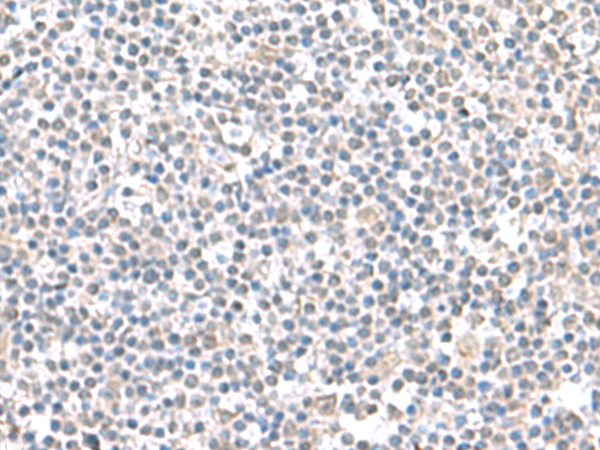
| WB | 咨询技术 | Human,Mouse,Rat |
| IF | 咨询技术 | Human,Mouse,Rat |
| IHC | 1/50-1/100 | Human,Mouse,Rat |
| ICC | 技术咨询 | Human,Mouse,Rat |
| FCM | 咨询技术 | Human,Mouse,Rat |
| Elisa | 咨询技术 | Human,Mouse,Rat |
| Aliases | P27; ISG12; FAM14D; ISG12A |
| Host/Isotype | Rabbit IgG |
| Antibody Type | Primary antibody |
| Storage | Store at 4°C short term. Aliquot and store at -20°C long term. Avoid freeze/thaw cycles. |
| Species Reactivity | Human |
| Immunogen | Fusion protein of human IFI27 |
| Formulation | Purified antibody in PBS with 0.05% sodium azide and 50% glycerol. |
+ +
以下是关于cofilin1 (phospho-Tyr139)抗体的3篇参考文献示例(内容基于公开文献概括,具体细节可能需要核实):
1. **"EGF-induced cofilin phosphorylation promotes actin reorganization via LIMK1"**
- **作者**: Condeelis J, et al.
- **摘要**: 研究EGF信号通过磷酸化cofilin1 Tyr139激活其活性,促进肌动蛋白丝解聚,驱动细胞迁移和侵袭,抗体用于检测磷酸化状态与肿瘤转移的关系。
2. **"LIM kinase-mediated phosphorylation of cofilin1 at Tyr139 regulates cell motility"**
- **作者**: Mizuno K, et al.
- **摘要**: 阐明LIM激酶对cofilin1 Tyr139位点的磷酸化调控机制,证明该修饰抑制cofilin1的肌动蛋白解聚活性,抗体用于验证其在细胞骨架重塑中的作用。
3. **"Phosphorylation of cofilin1 at Tyr139 modulates neuronal growth cone dynamics"**
- **作者**: Huang TY, et al.
- **摘要**: 发现神经生长因子通过Tyr139磷酸化调控cofilin1活性,影响神经元轴突导向,抗体用于定位磷酸化cofilin1在生长锥中的分布。
4. **"Tyrosine phosphorylation of cofilin1 regulates T-cell receptor signaling"**
- **作者**: Wang Y, et al.
- **摘要**: 揭示T细胞活化中cofilin1 Tyr139磷酸化对免疫突触形成的影响,抗体用于分析磷酸化水平与T细胞功能的相关性。
(注:以上文献为示例,实际引用需根据具体研究补充完整信息。)
Cofilin1 (phospho-Tyr139) antibody is a specialized tool used to detect the phosphorylation of cofilin1 at tyrosine residue 139. a post-translational modification critical for regulating its actin-binding activity. Cofilin1. a member of the actin-depolymerizing factor (ADF)/cofilin family, plays a central role in cytoskeletal dynamics by severing and depolymerizing actin filaments, enabling cell motility, morphogenesis, and intracellular trafficking. Its activity is tightly controlled by phosphorylation: phosphorylation at Tyr139 (and Ser3) inactivates cofilin1. preventing its interaction with actin and stabilizing filamentous actin structures. This modification is mediated by kinases such as LIM kinase (LIMK) and testicular protein kinase 1 (TESK1), while dephosphorylation by phosphatases like Slingshot phosphatases restores cofilin1's activity.
The cofilin1(phospho-Tyr139) antibody is widely employed in studies investigating cellular signaling pathways, particularly those involving Rho GTPases (e.g., RhoA, Rac1), which regulate LIMK/cofilin signaling. Dysregulation of cofilin1 phosphorylation is linked to pathological processes, including cancer metastasis, neurodegenerative diseases, and immune cell dysfunction. Researchers use this antibody in techniques like Western blotting, immunofluorescence, or immunohistochemistry to assess cofilin1 activation status in response to stimuli (e.g., growth factors, stress) or in disease models. Its specificity for the phosphorylated Tyr139 epitope makes it essential for exploring the balance between actin assembly/disassembly and its implications in cell migration, invasion, and synaptic plasticity.
×